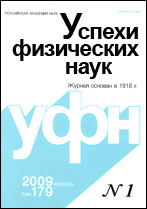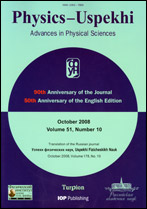|
This article is cited in 7 scientific papers (total in 7 papers)
REVIEWS OF TOPICAL PROBLEMS
From the origin of quantum concepts to the establishment of quantum mechanics
M. A. El'yashevich
V. I. Lenin Belorusskii State University
Abstract:
The article deals with the origins and development, in the first quarter of the 20th century, of the fundamental ideas advanced by Planck and Einstein and by Bohr and de Broglie concerning the quantum of action, the quanta of energy and the quanta of light, the stationary states of atomic systems and jumplike transitions between them, the correspondence principle, and the particle-wave dualism. It is shown how the development of the quantum concepts have led to two approaches to the creation of quantum mechanics by Heisenberg, Born, and Dirac in algebraic form and by Schrodinger in analytic form. The main stages in the evolution of nonrelativistic quantum mechanics are described, namely the development of wave mechanics and matrix mechanics, the proofs of their equivalence, the physical interpretation of the wave function, the generalized formulation of quantum mechanics as a unified theory, and the discovery of the uncertainty relations. The most important trends in the development of quantum mechanics in the course of its evolution are considered. A complete bibliography of the main period of evolution of quantum mechanics (July 1925–March 1928), classified by topics and by time of publication, is included.
Citation:
M. A. El'yashevich, “From the origin of quantum concepts to the establishment of quantum mechanics”, UFN, 122:4 (1977), 673–717; Phys. Usp., 20:8 (1977), 656–682
Linking options:
https://www.mathnet.ru/eng/ufn9713 https://www.mathnet.ru/eng/ufn/v122/i4/p673
|


| Statistics & downloads: |
| Abstract page: | 51 | | Full-text PDF : | 16 |
|





 Contact us:
Contact us: Terms of Use
Terms of Use
 Registration to the website
Registration to the website Logotypes
Logotypes








 Citation in format
Citation in format 
